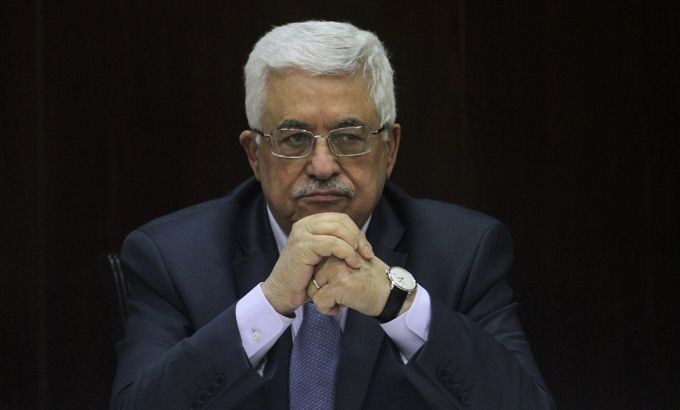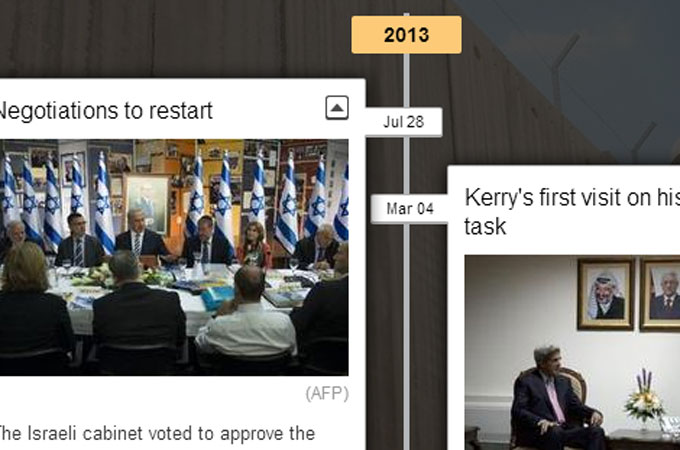Israelis and Palestinians open talks
Direct talks to set out framework for negotiations resume for first time in three years, as US hosts both parties.

Israelis and Palestinians have resumed direct talks for the first time in three years, with the United States urging negotiators to make tough compromises to reach a peace deal.
Israeli chief negotiator Tzipi Livni and her Palestinian counterpart Saeb Erakat sat side-by-side opposite top US diplomat John Kerry to share a traditional Muslim iftar meal in Washington DC on Monday.
Kerry, the US secretary of state, who has staked much of his reputation on bringing both sides back to the talks, first met with the teams separately.
He will also host a three-way meeting on Tuesday, before making a statement to reporters at around 11:00am local time (15:00 GMT), accompanied by the two negotiators.
Kerry was flanked at the dinner by seasoned diplomat Martin Indyk, who he named earlier as the US special envoy to the talks, and by White House Middle East advisor Phil Gordon.
US President Barack Obama has welcomed the start of the talks, calling the, a “promising step” forward but warning of “hard choices” ahead.
“The most difficult work of these negotiations is ahead, and I am hopeful that both the Israelis and Palestinians will approach these talks in good faith,” he said.
Obama promised the US is ready to support both sides “with the goal of achieving two states, living side by side in peace and security”.
‘Difficult choices’
Kerry also warned that “many difficult choices lie ahead for the negotiators and for the leaders as we seek reasonable compromises on tough, complicated, emotional and symbolic issues.
“I think reasonable compromise has to be a keystone of all of this effort.”
In a final solution, we would not see the presence of a single Israeli - civilian or soldier - on our lands.
The two sides have agreed to continue talking for at least nine months, a State Department official said.
“We’re going to make every effort to reach an agreement within that time frame, but… if we’re making progress and we’re continuing to make progress, this is not a deadline,” spokeswoman Jen Psaki said.
Indyk, 62, who has twice served as US ambassador to Israel and participated in the failed Camp David summit in 2000 under then president Bill Clinton, said he was taking on “a daunting and humbling” challenge.
The last direct talks collapsed in September 2010 amid continued Israeli settlement building.
Israel and the Palestinians remain deeply divided over so-called “final status issues”.
These include the fate of Jerusalem, claimed by both as a capital, the right of return for Palestinian refugees, the borders of a future Palestinian state and the fate of dozens of Jewish settlements scattered across the occupied West Bank.
Livni, speaking earlier after meeting UN chief Ban Ki-moon in New York, said the path ahead was “going to be very tough and problematic”.
“The meeting is to define what will come next in the negotiations,” senior Palestinian official Hanan Ashrawi told AFP.
“There must be a timeline and commitment from both sides on what they’ll agree about.”
Israel approves prisoner release
As a first step, Israel said Sunday it would release 104 Palestinians imprisoned before the 1993 Oslo accords – some of whom are said to have been involved in attacks on Israelis.
Erekat welcomed the move, saying the Palestinians considered it “an important step and hope to be able to seize the opportunity provided by the American administration’s efforts”.
Israeli President Shimon Peres, on a visit to Latvia, also hailed the resumption of talks.
“We want to establish a two-state solution of a Palestinian state beside the state of Israel, living in peace and friendship and bringing an end to all conflict, which is so necessary today for all the people in the Middle East,” he said.
On Monday, Palestinian President Mahmoud Abbas sought to lay out his vision for the talks, asserting that no Israeli settlers or border forces should be allowed to remain in a future Palestinian state, and reiterated the Palestinian position that the 1967 borders were non-negotiable.
Abbas’s firm statements appeared to challenge mediator Kerry’s hopes that the terms of the talks be kept secret.
“In a final solution, we would not see the presence of a single Israeli – civilian or soldier – on our lands,” Abbas told Egyptian journalists in Cairo where he met Egypt’s interim president Adli Mansour.
“An international, multinational presence like in Sinai, Lebanon and Syria – we are with that,” he said, referring to UN peacekeeping operations in those places.
